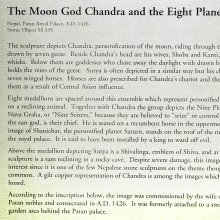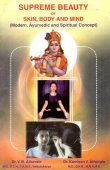Human life: 2 definitions
Introduction:
Human life means something in Hinduism, Sanskrit. If you want to know the exact meaning, history, etymology or English translation of this term then check out the descriptions on this page. Add your comment or reference to a book if you want to contribute to this summary article.
Images (photo gallery)
In Hinduism
Kavyashastra (science of poetry)
Source: Shodhganga: Bhismacaritam a critical studyHuman life and feelings should be spoken mainly in epic poems. The life of epic being human life or humanized life, must to be true to its pattern, exhibit a representative amount though not a plethora of a human mood, says John Clark. He also adds in regard with human life that a poem, without putting something of his day and generation in it, would not be advisable. All epic poets have written for their contemporaries. Greek epic has always been felt to be somehow a type of significant human experience and some generations have wanted to codify and explain the significance, sometimes with an inhibiting effect on writers.

Kavyashastra (काव्यशास्त्र, kāvyaśāstra) refers to the ancient Indian tradition of poetry (kavya). Canonical literature (shastra) of the includes encyclopedic manuals dealing with prosody, rhetoric and various other guidelines serving to teach the poet how to compose literature.
Ayurveda (science of life)
Source: International Research Journal of Ayurveda and Yoga: Role of Ayurveda in the Management of Manas Roga (Mental Disorders)Human life is considered as the invaluable opportunity to achieve the prime goals of the life wiz Dharma (righteousness, moral values), Artha (the objects of the senses), Kama (pleasure, love, psychological values) and Moksha (liberation, spiritual values). To achieve all these one need a healthy and calm life. Whole ancient society tried to achieve all four prime goals of life for which they advocated some rules for healthy life by which they had a smooth, safe, assured, steady and healthy life style. [...] In today’s metaphysical society, human life has become speedy, mechanized, and less effective and more centred, which contribute to more production of Kama (Desire), Krodha (anger), Lobha (greed), Bhaya (fear), Soka (Grief), Chinta (Worry) and Irsha (envy) etc. like Manasa Vikars (Mental disorders).

Āyurveda (आयुर्वेद, ayurveda) is a branch of Indian science dealing with medicine, herbalism, taxology, anatomy, surgery, alchemy and related topics. Traditional practice of Āyurveda in ancient India dates back to at least the first millenium BC. Literature is commonly written in Sanskrit using various poetic metres.
See also (Relevant definitions)
Partial matches: Life.
Full-text (+247): Artha, Avasthacatushtaya, Purushartha, Purvavaya, Dashami, Yatayata, Dhavandhala, Dasama, Parai, Samsaracraka, Parahi, Dvicaramasamaya, Ilivayassu, Ahitayu, Martyadharma, Nrigati, Adityabala, Dvicarama, Dvicaramatva, Aparavayassu.
Relevant text
Search found 206 books and stories containing Human life; (plurals include: Human lives). You can also click to the full overview containing English textual excerpts. Below are direct links for the most relevant articles:
Samkhya thoughts in the Mahabharata (by Shini M.V.)
Introduction to the Śāntiparva < [Chapter 3 - The Philosophical Tenets in the Śānti-parva]
Introduction to Indian philosophy < [Chapter 1 - Introduction]
Yoga Philosophy in Śānti-parva < [Chapter 3 - The Philosophical Tenets in the Śānti-parva]
Understanding Literature < [July – September, 2007]
The Unconquerable < [June 1944]
Human Life < [July – September, 2006]
Matangalila and Hastyayurveda (study) (by Chandrima Das)
Concluding Remarks < [Chapter 2]
Elephants in Myths and Metaphors (Introduction) < [Chapter 4]
Metaphors related to Elephants < [Chapter 4]
Chaitanya Bhagavata (by Bhumipati Dāsa)
Verse 1.2.66 < [Chapter 2 - The Lord’s Appearance]
Verse 3.9.251 < [Chapter 9 - The Glories of Advaita]
Verse 1.13.195 < [Chapter 13 - Defeating Digvijayī]
A study of the philosophy of Jainism (by Deepa Baruah)
Kamashastra Discourse (Life in Ancient India) (by Nidheesh Kannan B.)
2. Works on Kāmaśāstra (j): Caturvargasaṅgraha < [Chapter 2 - An Appraisal of Kāmaśāstra Works in Sanskrit]
1. Life of ancient Indian society (Introduction) < [Chapter 4 - Positioning Kāma among the Puruṣārthas]
Related products
(+1 more products available)






